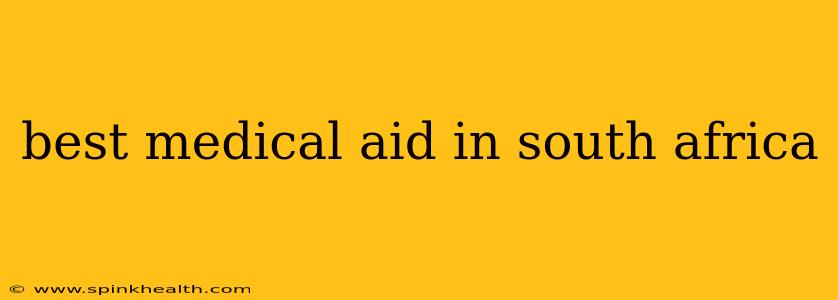Choosing the right medical aid in South Africa can feel like navigating a maze. With so many options, each boasting different benefits and price points, it’s easy to feel overwhelmed. This isn’t just about numbers and premiums; it's about securing your health and the well-being of your loved ones. My journey to finding the best medical aid for my needs involved a lot of research, comparisons, and frankly, a few headaches. Let me share my experience, and hopefully, shed some light on your own search.
What Factors Determine the "Best" Medical Aid?
Before diving into specific schemes, it's crucial to understand that the "best" medical aid is subjective. What works perfectly for one family might be completely unsuitable for another. Several factors influence this crucial decision:
- Your budget: Medical aid premiums range dramatically. Be realistic about what you can comfortably afford each month without compromising other essential expenses.
- Your healthcare needs: Do you have pre-existing conditions? Are you pregnant? Do you have children? These factors significantly impact the type of cover you'll require.
- Your lifestyle: Do you frequently visit the doctor? Do you anticipate needing specialist care in the near future? A higher premium might be worth it if you anticipate significant healthcare costs.
- Your preferred healthcare providers: Check if your preferred doctors and specialists are on the medical aid's network. Out-of-network costs can quickly escalate.
What are the different types of medical aid plans in South Africa?
Many South Africans find this a critical question when researching medical aid options. Here's a simplified look:
- Hospital Plans: Primarily cover in-hospital expenses, including surgery, hospitalization, and some related treatments. They offer limited cover for doctor visits and out-of-hospital care.
- Comprehensive Plans: Offer a wider range of benefits, including in-hospital and out-of-hospital care, specialist consultations, and medication. They generally come with higher premiums.
- Gap Cover: This isn't a medical aid plan itself, but a supplementary insurance product. Gap cover helps to cover the difference between the medical aid's rate and the actual cost of treatment, reducing your out-of-pocket expenses.
How do I compare different medical aid options?
Comparing medical aid plans isn't a simple task. However, several key features to consider:
- Benefit options: Carefully review what each plan covers, including doctor visits, specialist consultations, hospital stays, medication, and chronic medication.
- Premium costs: Compare monthly premiums across different plans and consider the value you're receiving for the price.
- Network providers: Check if your preferred doctors and hospitals are in the medical aid's network.
- Waiting periods: Be aware of waiting periods for certain benefits, especially pre-existing conditions.
- Claims process: Understand the medical aid's claims process to ensure a smooth experience.
What is the best medical aid for families?
The "best" family medical aid depends entirely on your family's specific needs and budget. Some popular options frequently mentioned offer family plans with varying levels of coverage. Always thoroughly compare plans from different providers to find the best fit for your family.
What are the best medical aids for chronic illnesses?
Medical aids with strong chronic illness management programs are vital for individuals with ongoing health conditions. Many schemes offer comprehensive chronic disease management, including medication, specialist visits, and other essential support services. It's critical to carefully examine the specific benefits offered for chronic conditions when choosing a plan.
Which medical aid offers the best value for money?
The best value for money often depends on your individual needs and risk profile. A plan with a lower premium might not be the best option if it lacks crucial coverage. Always carefully weigh the benefits against the cost to determine the plan that provides the best value. Consider using comparison websites to streamline this process.
Is it worth getting gap cover with my medical aid?
Gap cover is a valuable supplementary insurance product. It can significantly reduce your out-of-pocket expenses by covering the shortfall between your medical aid’s payment and the actual cost of treatment. Whether or not it’s worth it depends on your individual risk tolerance and financial capacity.
My journey to finding the right medical aid wasn’t a sprint, but a marathon. It demanded careful consideration of my budget, healthcare needs, and lifestyle. The key is to take your time, do your research, and choose a plan that genuinely protects your well-being, without breaking the bank. Remember, the "best" medical aid isn't a one-size-fits-all solution – it's the one that best fits your unique circumstances.

